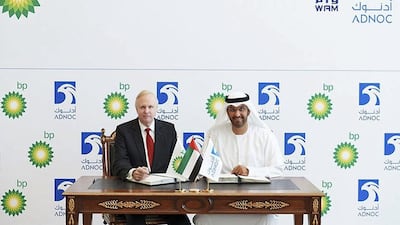Abu Dhabi’s oil leadership is down to a very short list of contenders for the remaining stake in its flagship onshore oil concession after the deal last week giving BP a 10 per cent share for US$2.2 billion, which also brought Abu Dhabi in as one of BP’s largest shareholders.
The negotiating process for stakes in Abu Dhabi Company for Onshore Oil Operations (Adco), which accounts for slightly more than half of Abu Dhabi’s 3.1 million barrels per day of output, has dragged on for three years since the expiry of the old concession, as the emirate’s Supreme Petroleum Council, advised by Abu Dhabi National Oil Co. (Adnoc), has evaluated proposals.
With BP’s deal and the previous ones, which gave France’s Total a 10 per cent stake and Japan’s Inpex and South Korea’s GS Energy (backed by Korean National Oil Co.) 5 and 3 per cent, respectively, Adnoc now expects to wrap up deals covering the remaining 12 per cent by early next year, according to a person familiar with the negotiations.
Top of the list of contenders are Chinese state-controlled energy companies, including China National Petroleum Coorporation (CNPC), parent of PetroChina, its publicly listed entity. Other Chinese entities are also in the running, according to industry sources.
It has long been expected that Adnoc would bring in at least one Chinese partner in recognition of the country’s growing importance as a customer.
China ranked fourth as a source of UAE exports in 2014 at $14bn, which trailed Japan ($37.5bn), India ($24.4bn) and South Korea ($14.8bn), though China’s numbers would be boosted further by its exports to Singapore ($14bn), where PetroChina is operator of one of t he region’s largest refineries.
China and the UAE have been making efforts on many fronts to deepen their trading relationship, including a deal three years ago for China to double its Abu Dhabi crude imports.
China Petroleum Engineering and Construction Corporation, a CNPC unit, last year won a $330 million contract to help develop the Mender oilfield, which is part of Adco’s South East Full Field Development project that includes the Sahil and Qusahwira oilfields. Mender is expected to add 20,000 bpd, or about 5 per cent of the increase to bring Adco output to 1.8 million bpd by 2018.
It has not yet been decided, however, what the Chinese participation will be, especially as its companies do not have the experience of Western oil majors, such as Total and BP, in advanced techniques to maximise oil recovery.
“I get the feeling Abu Dhabi is holding the Chinese somewhat at arm’s length,” says Robin Mills, the chief executive of Qamar Energy, a Dubai consulting company. “The Chinese are typically involved in projects that are not technically complicated – such as South Sudan – but need big construction and labour efforts.”
There is also the controversial issue of Chinese involvement in Middle East crude oil trading over the last several years and the big state companies’ unabashed effort to be the major influence on oil prices in Asia.
Giving Chinese companies a large slice of Abu Dhabi crude – which would be the result of a significant stake in Adco – would increase their pricing power further.
Nevertheless, the alternatives have slimmed down considerably since the first list of contenders three years ago and CNPC is expected to get some kind of operating role.
India is also a fast-growing trading partner and crude oil buyer and a consortium led by ONGC Videsh has submitted a bid for a stake. Negotiations with the Indian companies are understood to have become bogged down.
Among the other leading contenders, Royal Dutch Shell had said earlier this year that it was still interested but after its $50bn merger with BG it has been concentrating on selling up to $30bn of assets – last week, it exited Canadian oil sands projects – and the company is understood to have demurred from bidding the necessary $2.2bn for a 10 per cent Adco stake.
Other contenders still nominally in the running would be Norway’s Statoil, which has been discreetly lobbying since 2010 for some role in Abu Dhabi’s oil development, including submission of an Adco bid. Statoil’s strategy is seen as focusing on getting a slice of Adnoc’s Adma offshore concession when it comes up for renewal in 2018, with the offshore enhanced oil recovery the Norwegian’s particular area of strength.
amcauley@thenational.ae
Follow The National's Business section on Twitter

